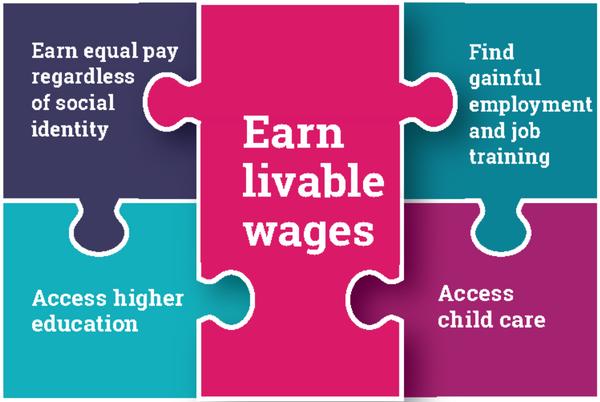
16 minute read
Table 3. Equity Lens in WAGES Covenings
• As noted in previous reports, many of the policy advocacy grantees work together along with
WFCO in established coalitions around shared policy priorities, and PA grantees found
Advertisement
WAGES convenings helpful for continuing/deepening conversations that took place in those settings. In particular, grantees noted collaboration around early childhood education and child care policy. • A few formal partnerships were also noted, some from previous years that have continued. o There was a formal partnership between a DS and PA grantee around a grantmaking opportunity to help adult learners receive credit for existing skills. o One DS grantee contracted out their coaching services to another DS grantee for their program (as noted in previous reporting). The geographic distance made the partnership unsustainable, but the DS grantee that received the coaching has since used the model and hired a local coach for their program participants. o One PA grantee co-facilitates another PA grantee's summer youth leadership program. o One PA grantee completed an initial feasibility study for a DS grantee initiative.
Challenges to deeper collaborations:
• Limited time/capacity to deepen collaborations. • Relationship-building and forging collaborative opportunities is harder to foster in a virtual setting (the in-person convenings facilitated relationship-building) • Difficult to ask other organizations to add another issue to their agenda. • Challenges when the model or program is very different than others in the cohort and/or a remote geographic location compared to other grantees.
Equity
Grantees value the equity lens that WAGES employs and have appreciated the various opportunities to learn and grow in this area, Year 3 was no different.
TABLE 3. EQUITY LENS IN WAGES COVENINGS
Equity Topic/Activity August 2020 Bias, Policing, and Safety presentation
October 2020 Voting Rights presentations Grantees shared get-out-the-vote strategies that have worked and grassroot efforts they are engaged in (e.g., encouraging clients to ensure they are registered to vote; sharing registration link; providing stamps for mailing in ballots; presenting a ballot measure webinar, etc.).
November 2020 Break-out session on equitable implementation of passed ballot measures The session surfaced various considerations (e.g., universal preschool to all needs more intensive intervention for at-risk children).
Grantee Feedback
Grantees described it as very informative, deepening understanding of the history of policing, as well as providing clarity on "defunding" or "abolishing" the police.
December 2020 Equity Topic/Activity Organizational Equity Capacity Resource Sharing & Discussion
March 2021 Equity Learning & Practice small group discussions
Grantee Feedback
Grantees engaged in active discussion and received resources around how to navigate working from home during the pandemic (e.g., professionalism standards and how those are rooted in "white supremacy culture"5) and digital access for staff and adapting to providing services online.
Grantees discussed how they were implementing these learnings into practice (e.g., developing a participant advisory council, convincing Board of Directors that equity must be a focus for the organization, etc.)
"I've loved all of the trainings to bring intentional learning around different facets of equity and inclusion. They have been incredibly valuable and are just kind of refreshing because you don't always get a chance to step back and be a learner. You're always doing or thinking." -Policy Advocacy Grantee
Policy & Election
In Year 3 of WAGES, the ability to move policy priorities forward was shaped in a significant way by COVID-19. PA grantees needed to pivot policy advocacy strategies due to COVID-19 and its effects on the 2021 legislative session (see the Policy Advocacy Grantee Efforts section for more detail).
In convenings leading up to the 2020 election, WAGES grantees:
• Provided updates and shared resources around ballot measure efforts (e.g., Propositions EE, 118, and 271) • Shared get-out-the-vote strategies and tactics to encourage Coloradans to vote • Participated in an optional virtual training around policy advocacy where opportunities for collective action were surfaced
In the November convening following the election, WAGES grantees came together to check in with one another, discuss the status of outcomes and implications of the election, and explored action steps needed to implement state ballot measures equitably.
5 For example, see the following for more detail on white supremacy culture: https://www.thc.texas.gov/public/upload/preserve/museums/files/White_Supremacy_Culture.pdf
COVID-19
During Year 3 of WAGES, the COVID-19 pandemic was a top issue for grantees and for the participants served by WAGES.6 WFCO converted all WAGES grants to general operating grants so grantees could respond to changing needs for their organizations and the communities they serve. Through WFCO’s Women and Families of Colorado Relief Fund, each WAGES grantee also received additional general operating support to help them address the emergency needs of Colorado women and their families impacted by COVID-19 and advance policy solutions to the challenges exacerbated by the pandemic.
Grantees were asked about issues and short- and long-term needs for WAGES participants (and Coloradans) as a result of the pandemic. "Women of color with children are being pushed out of the workforce at disproportionate rates."
“Tech needs trump all other needs when the only way to get the service is via technology.” - WAGES Grantees
Several pandemic-related challenges were identified by grantees:
All grantees were addressing digital divide issues for program participants, staff, volunteers, etc. (e.g., digital literacy issues; lack of devices, no internet, etc.), and because they were unable to do face-toface meetings, outreach, etc., they were pivoting to providing services online and bolstering organizational websites. Grantees were also shifting efforts to pandemic relief, cash assistance, and basic needs support for families and communities.
The pandemic was also creating concerns around organizational stability, staff management conducted virtually, and fostering a supportive work culture during a challenging time. Additionally, in interviews, grantees raised:
• Staff Capacity: Due to organizational demands and an insufficient workforce, staff are often left wearing too many hats. This was a reality for some organizations prior to the pandemic and has been exacerbated with the pandemic. This, along with staff turnover, creates challenges in maintaining efficiencies in workflow, engaging in larger strategic planning efforts and implementation, and/or allowing for innovation or growth to take place. • Funding: Long term funding stability was noted as a key concern, with numerous reports of loss of funding as a result of shifted priorities by funders and the state as a result of COVID19. This instability results in significant organization capacity going to seeking and maintaining funding, thus detracting from the ability to implement efforts and engage in longterm planning, program growth, and innovation. Further, funders often fund specific, generally smaller programs, leading to tailor programs to funding requirements rather than to larger strategic organizational needs and to organizational capacity issues (e.g., staff must track various funder-related data points). DS grantees were shifting programs and supports online and were bolstering existing online programs to meet participant needs. The pandemic was also exacerbating many challenges for DS
6 Early action that was taken in April and May of 2020 by WFCO and WAGES grantees was highlighted in the Year 2 WAGES Evaluation Report due to the timing of when the report was being developed and a desire to not delay the dissemination of pandemic-related information until Year 3 (please see the Year 2 WAGES Evaluation Report for further detail on April and May 2020 activities).
grantees and the respective communities they served. DS challenges that were surfaced in grantee interviews included:
• A need for flexibility: DS grantees discussed that COVID-19 required much pivoting, flexibility, and creativity in how they supported women. For example, one DS grantee developed a virtual interview booth for people who are applying for jobs. The DS grantee said, “If they don't have what they need, if they don't have Zoom, or if they don't have a computer, they can come into our office, they can use our virtual interview booth to do interviews.” • Addressing digital literacy: Another important challenge grantees faced was addressing digital literacy skills, and digital access. One grantee expressed gratitude in being able to use funding to support women getting new laptops. One grantee stated how they tried to find the silver lining in COVID-19 by recognizing that by going virtual, services became more accessible for many women thereby expanding the organization's reach. • Intersection of racial injustice and COVID-19 on staff mental health: For some grantees, the intersectionality of racial injustice in combination with COVID-19 proved trying to their mental health, and they learned the importance of slowing down in order to best serve women and women of color more specifically. • Decreasing opportunities: One DS grantee shared that finding hosts for internship programs were dwindling, and the grantee was developing virtual internships. DS grantees were also seeing decreased engagement from some participants and were seeing less interest from potential participants ("a low economy usually encourages enrollment, but not this time").
WAGES Participants, according to DS grantees, were experiencing a lot of uncertainty and confusion. Further, WAGES participants were in some cases seeking out fewer services and interacting less; delaying jobs due to needing to support children's remote learning and due to fears of losing benefits; and were experiencing increased mental/behavioral health needs.
PA challenges that were noted in convenings and grantee interviews included:
• Complexity of Issues: It is not possible to address family leave policies without also addressing child care and early education access. If examining these issues, you also need to look at the declining workforce in child care and early childhood education, industries largely supported by women, and women of color in particular, who are also faced with injustices and barriers to security as a result of systemic racism. Policy work feels incredibly daunting as result. • Dismantling systemic racism: Many of the issues are rooted within existing policies, making an entry point difficult to identify and stunting the impact of legislation and policies that are implemented to promote the economic security of women and families, particularly for women of color. • A demanding legislature: COVID-19 has led to many changes in the workings of the legislature, creating challenges in planning for and participating in legislative sessions or issue advocacy and lobbying. Garnering participation and testimony from the women and children at the heart of the issues is likewise challenging, particularly during virtual lobby days where tech issues/access and the digital divide make it difficult to engage community members in a meaningful way. "We're really just pushing for crumbs in the grand scheme of what people genuinely need to survive and thrive." - Policy Advocacy Grantee
• Political climate: A divisive political climate makes it challenging to pass policy that is equitable for all. For example, a PA grantee laments, "How do you convince folks of a certain ideology that everyone, universally, regardless of immigration status, is deserving of basic humanity or human rights?"
Immediate, intermediate and long-term needs around COVID-19 relief include:
• Immediate: ® Basic needs (e.g., food, diapers housing, etc.) ® Access to child care ® Employment ® Technology solutions (e.g., internet, phone service, laptops, etc.) ® Access to services ® Cash assistance ® Digital and technology access (e.g., pcs for people, comcast) ® Social supports for undocumented families ® Expansion of CCAP ® Portable/flexible benefits ® Flexible and trusting funding
• Intermediate and Long-term: ® Training for displaced workers, primarily for service industry and other low wage work ® Post-secondar and workforce training; ® Access to affordable (emergency) child care (especially for infants) and elder care ® Upskilling investment; increased compensation for front-line workers ® Continued access to public supports (e.g., SNAP, WIC, etc.)
“Trust around creativity and pivoting. Trust that we will use funding correctly, even if it doesn’t look the same as years past. Let us be creative and trust we have best interest of clients in mind.”
Summary
This report presents findings from evaluation of WAGES activities from March 2019 - through April of 2021 and is designed to support ongoing learning for WFCO, WAGES grantees, and other stakeholders interested in advancing and accelerating economic opportunities for Colorado women and their families.
The third year of WAGES work was one unlike any other, with incredible challenges facing women and the organizations serving them. WAGES grantees and women met these challenges with innovations, flexibility, persistence, and resiliency. As WAGES enters its fourth and final year, grantees will continue to engage in shared learning, center equity in all efforts, work towards policies that dismantle structural barriers to achieving women's full potential, and support women to overcome the challenges exacerbated by the pandemic.
Throughout WAGES, grantees have shared the many benefits they have had from being a part of the learning cohort community. Based on grantee feedback, Year 4 virtual convenings that bring grantees together will continue to be of value for advancing equity, resource sharing, staying up to date on work happening across the state, and informal and formal networking opportunities. In this final year, the group may want to consider desires and opportunities for shared learning and engagement post WAGES.
Finally, grantee input also was gathered (see Appendix B) and used to inform WFCO's 2021-25 strategic framework and future grantmaking efforts. WFCO will continue to support gender, racial, and economic equity for Colorado women and families through its WINcome grantmaking program, designed to address the economic realities of women in Colorado by providing flexible and holistic resources.
WFCO’s WINcome grantmaking strategy builds on learning with the WAGES cohort and from the Women and Families of Colorado Relief Fund. WINcome is an evolution of WAGES that will continue to invest in partnerships with both direct service and policy advocacy grantees to demonstrate that individuals can advance economically when they are trusted to make their own decisions about what they and their families need. WINcome grants will support Colorado women who participate in programs offered by grantee partners by providing direct cash assistance to supplement, not replace, their income and other benefits they may receive through public and nonprofit programs. WINcome grants will also advance systemic changes that support gender, racial, & economic equity for Colorado women and families.
Appendix A - Methods
To answer the WAGES evaluation questions and minimize reporting burden on grantees in Year 3, three primary data collection methods were selected: 1) A WAGES Survey that was administered to grantees once; 2) information gathering from grantees during WAGES Convenings through activities, facilitated discussions, and surveys, as applicable; and 3) one-on-one interviews that were conducted with all WAGES grantees.
WAGES Survey: The WAGES Survey was designed to collect the following information:
• Direct service information (Direct Service grantees only) – participant demographics, barriers to a livable wage, financial support systems utilized, services accessed, and participant outcomes; and grantee successes and challenges with implementation of services and lessons learned. • Policy advocacy information (Policy/Advocacy grantees only) – strategies and tactics implemented, outcomes, successes and challenges of strategies and tactics, and lessons learned. • Cohort learning (all grantees) – reflections on the cohort learning model, including how the model has supported services/strategies/tactics, ways to improve the model, and new collaborations, strategies, and efforts that have resulted. • Evaluation & TA (all grantees) – questions on areas for evaluation support as well as length of time spent on the survey and what felt difficult to answer to support future refinements to evaluation tools and processes. WAGES Convenings: WFCO conducts WAGES convenings to bring together all grantees, and OMNI collects session evaluations as applicable to collect grantee feedback. OMNI also documents convening notes for analysis and reporting.
Grantee Interviews: From October to December 2020, OMNI conducted grantee interviews with all 20 grantee organizations/coalitions. The purpose of the interviews was to better understand the impact of being part of the cohort learning model, what the largest impacts are to grantees’ work and communities right now, and to surface recommendations for WFCO’s strategic grantmaking in the future. Interviews ranged in length from 40 minutes to one hour and were audio-recorded and transcribed for theme analysis.
Data and Evaluation Considerations
Below, we share important data and evaluation contextual information that will be helpful to the reader in interpreting evaluation findings.
Direct Service Data
Aggregate-level reporting. Grantees provide aggregate-level information on women served through WAGES (e.g., grantees provide the total number of women who received financial coaching services rather than a person-level data file with information on each woman served). After careful consideration during the planning stages, we determined that aggregate-level reporting will meet the needs of the evaluation and is appropriate for the resources available to support grantees in providing data for the evaluation. A limitation of this approach, however, is that the evaluation 1) relies on the accuracy of grantees to tally the information on women served and 2) cannot examine information beyond the set of variables provided (e.g., we cannot further disaggregate the data to explore additional questions by sub-groups of women such as the number of women employed by race/ethnicity).
Variation in number of women served. The number of women served through WAGES varies by direct service grantee. As such, summary information on women served is weighted towards those grantees who serve greater numbers of women. For a breakdown of each grantee’s number of women served in relation to the overall sample, see Table B.1. in Appendix B.
Information excluded: Through the co-creation process, it was determined that some questions about women’s identities, although important, would be too difficult to collect systematically across organizations due to inconsistent existing data collection practices (e.g., sexual orientation, immigrant status were not typically captured). As such, the evaluation cannot report on these areas through the WAGES Survey but could capture information on these factors through qualitative efforts in the future.
Outcomes reporting: Due to the diversity of DS grantee programming, participant outcomes are reported as data become available to allow for greater flexibility in tracking when changes occur. This approach means progress can be shared during and after programming, regardless of program completion status, which can be particularly helpful for programs that take place over a greater length of time or for programs that do not truly "exit" participants due to the ongoing support that is offered. In Year 4, OMNI will implement a process to ensure that final outcomes reported are appropriate to the nature of programming.
Policy Advocacy Data
Evaluating the impact of advocacy and policy work. Methods to evaluate policy and advocacy efforts lag other evaluation areas due to the complexity and evolving nature of the political process itself. The WAGES evaluation has an added layer of complexity in that it seeks to examine efforts across multiple organizations engaging in different focus areas and in different policy and advocacy arenas. As such, rather than evaluate the outcomes of these activities, the evaluation was designed to learn from the reflections of grantees as they engage in the work, and to leverage their expertise to understand the strategies and tactics that will help advance women’s economic prosperity.
Contribution versus attribution. There are many forces at play and factors that intersect to influence changes in complex systems. It is rarely possible to attribute policy changes to a single organization, initiative or effort. As such, we are using the evaluation to learn about the work of grantees to identify a deeper understanding of the strategies and tactics that contribute to changes rather than trying to attribute definitive judgements about the successes or failures of efforts.
Isolating WFCO-funded activities. In some instances, WAGES funding is a small portion of an organization’s overall operating budget. As such, it is often difficult for grantees to parse out and report on activities that are specifically WAGES-funded. On the WAGES Survey, grantees were asked to do their best to report on activities to which WAGES funding contributed, but it is important to note that the evaluation is not designed to isolate the impact of WAGES funding.
Strategic Learning
The WAGES evaluation is designed to learn about what grantees are doing to promote Colorado women’s economic security – what services, strategies, and tactics are being carried out; what’s working and what isn’t – and what impact grantee organizations are having in different ways that are supportive to Colorado women and their families. The audiences for this information include WFCO, its board, grantee organizations, and when applicable, the larger field.







